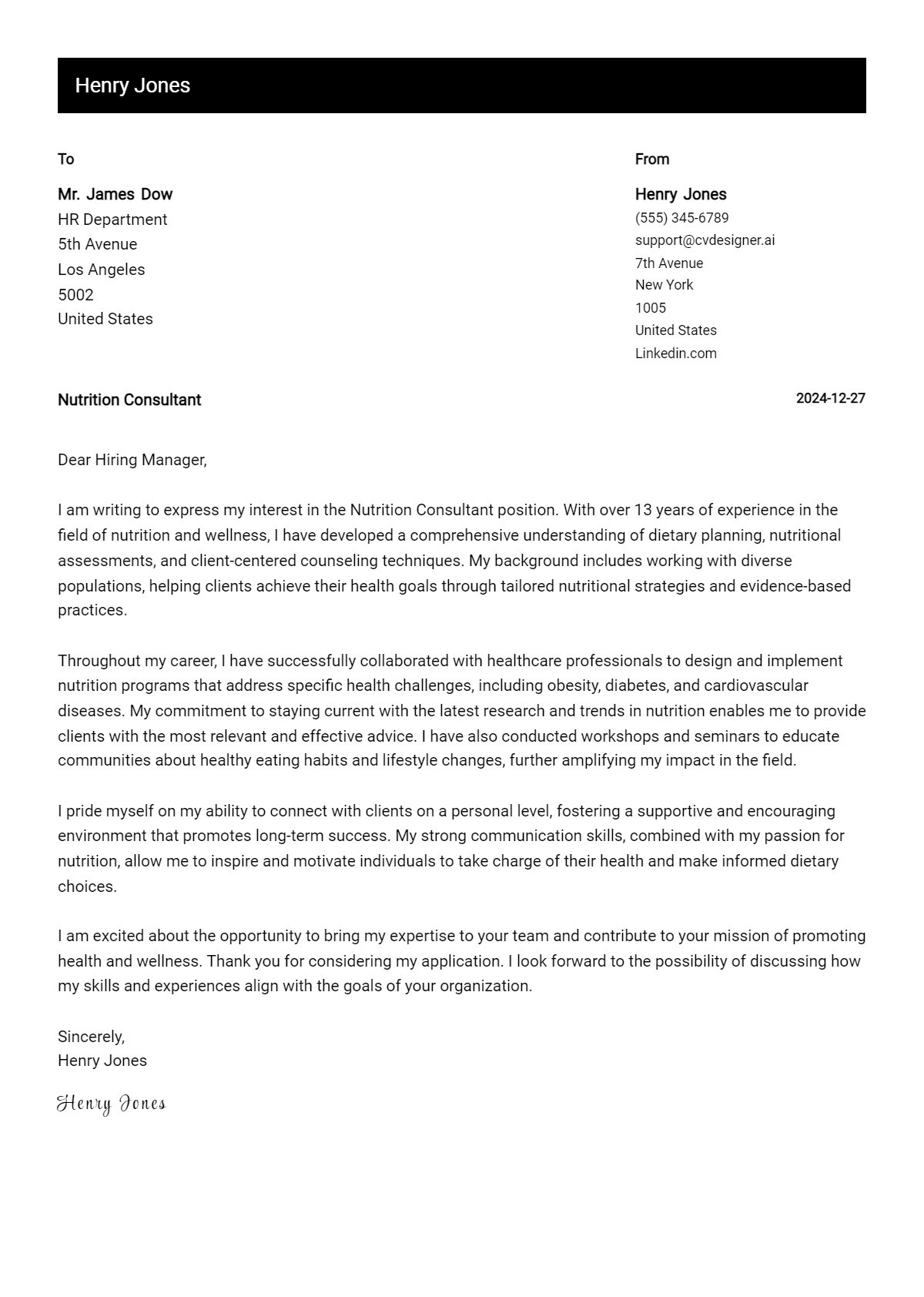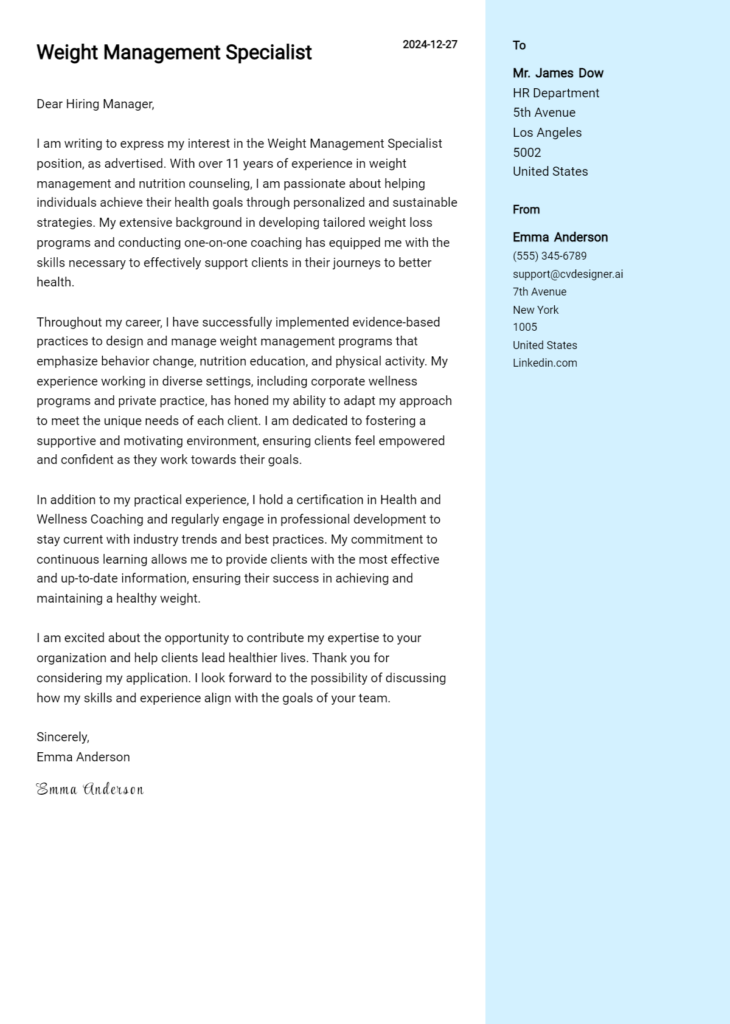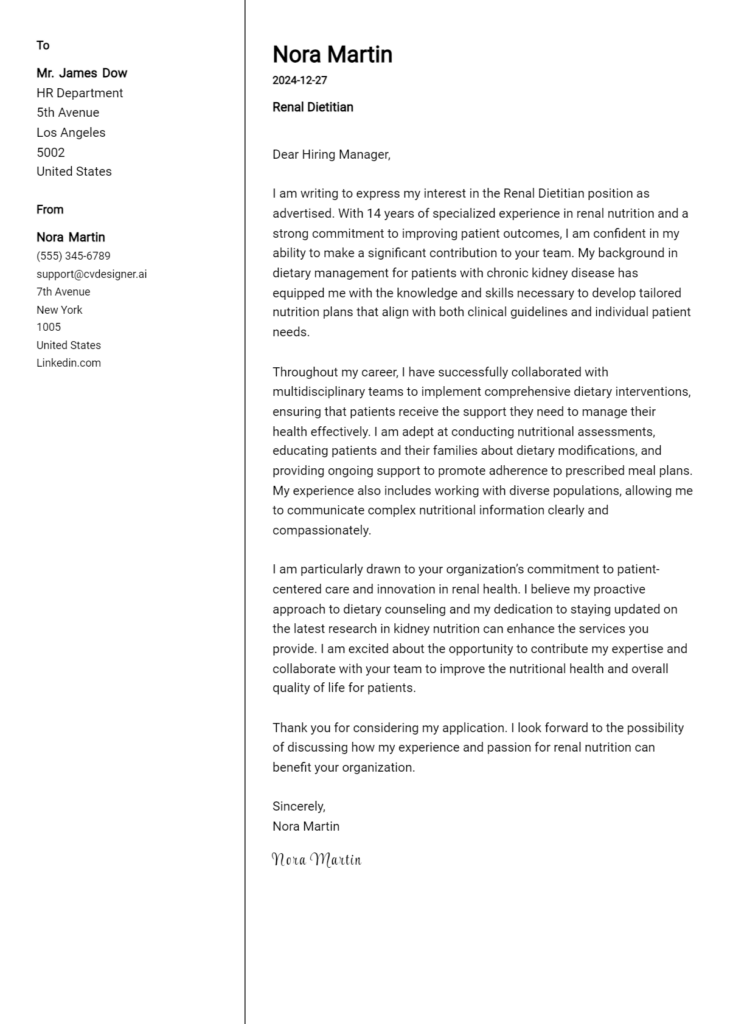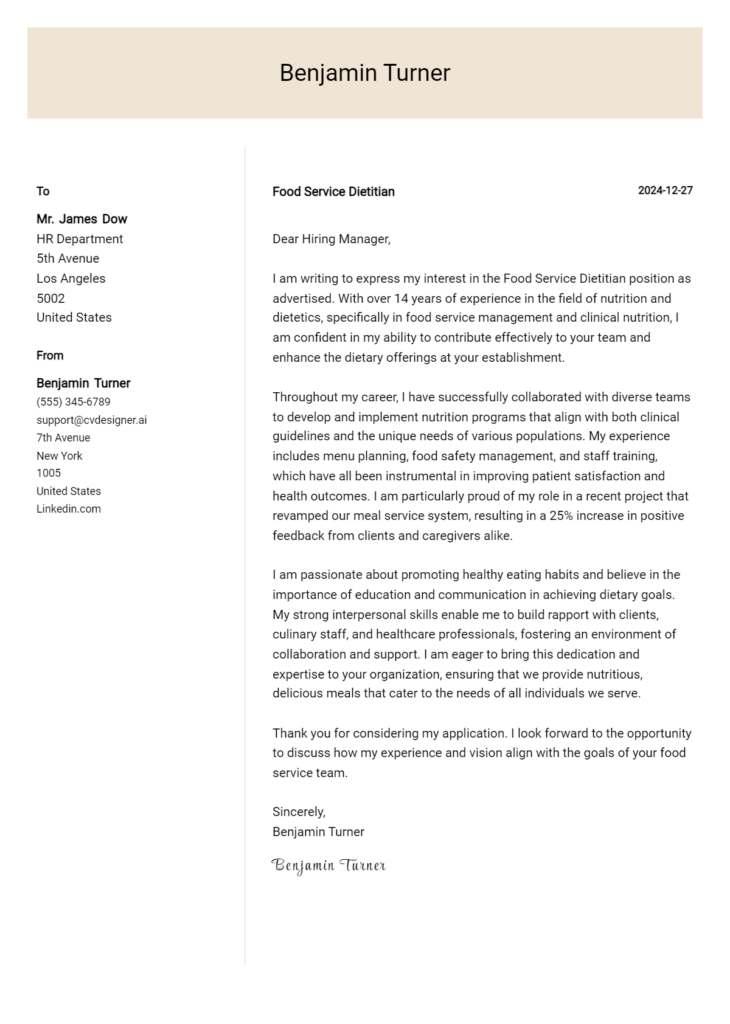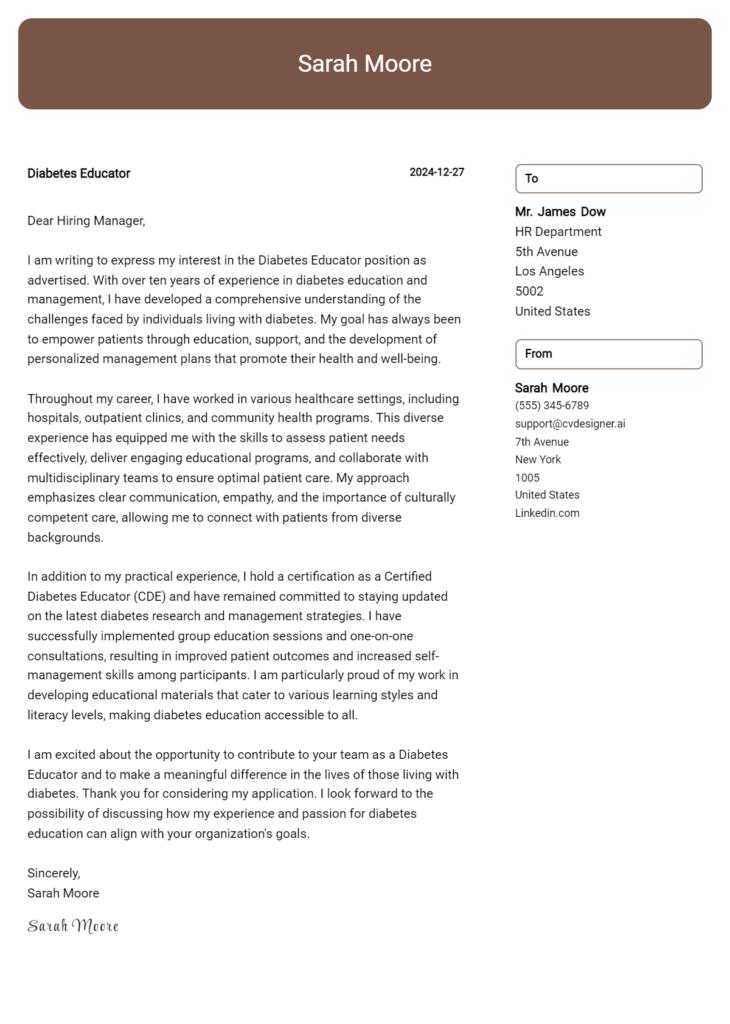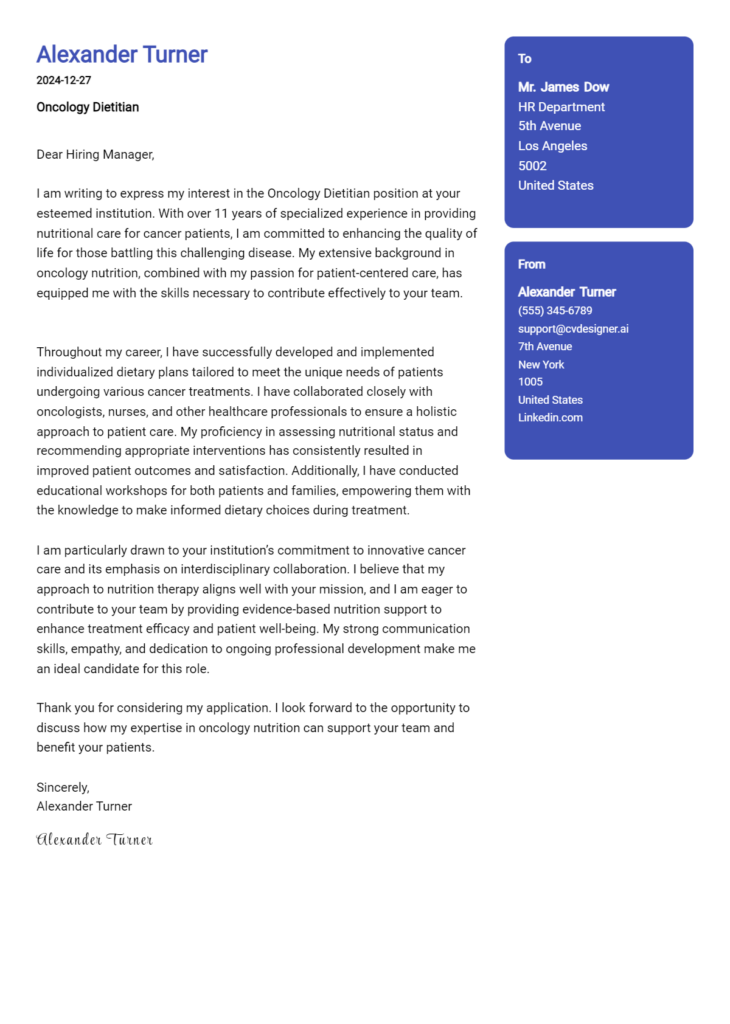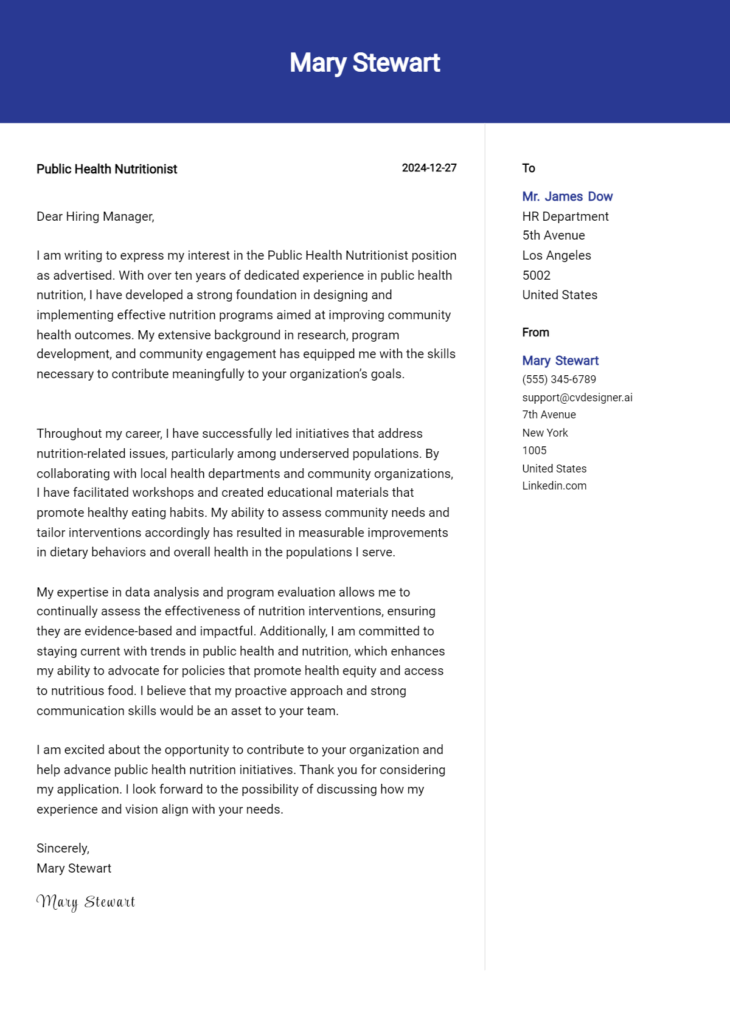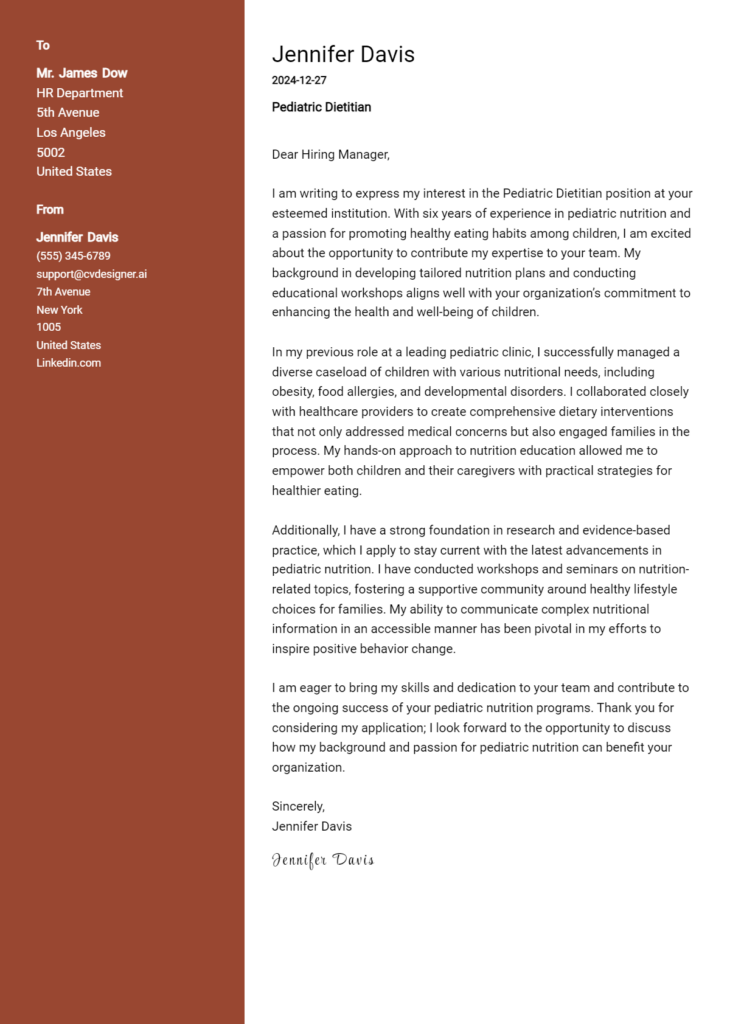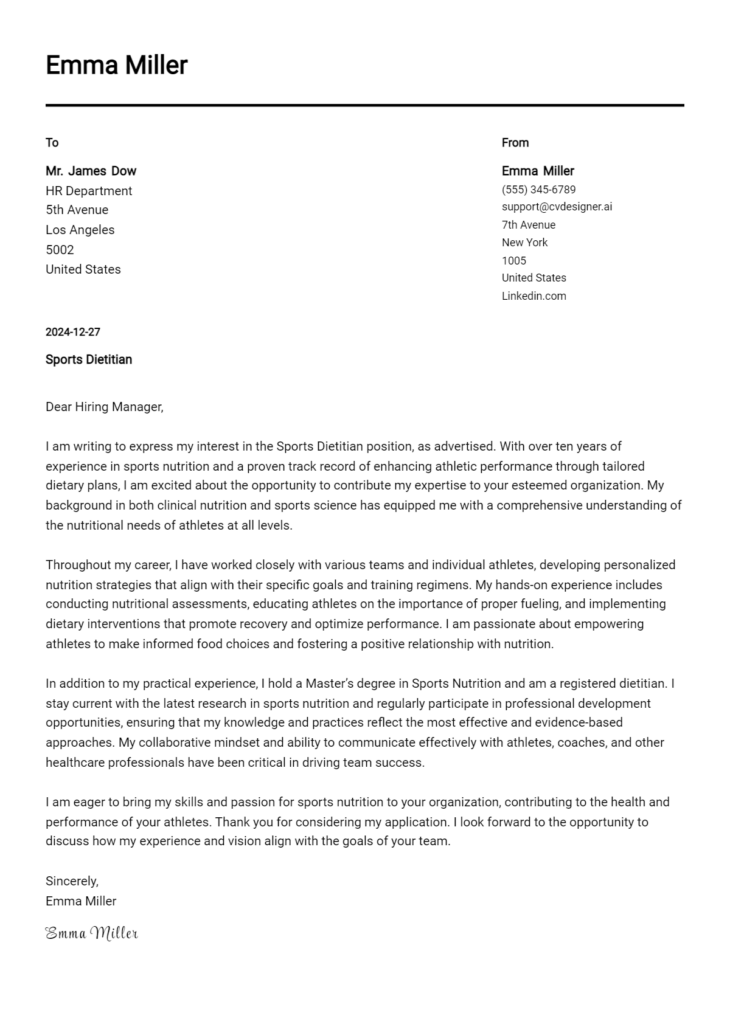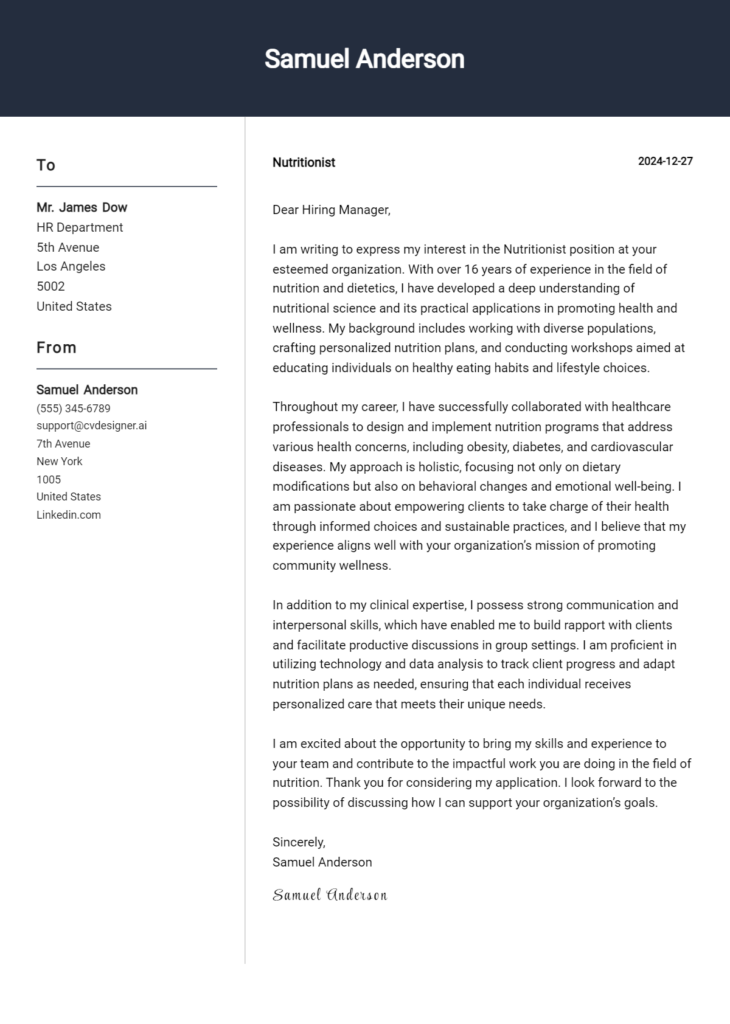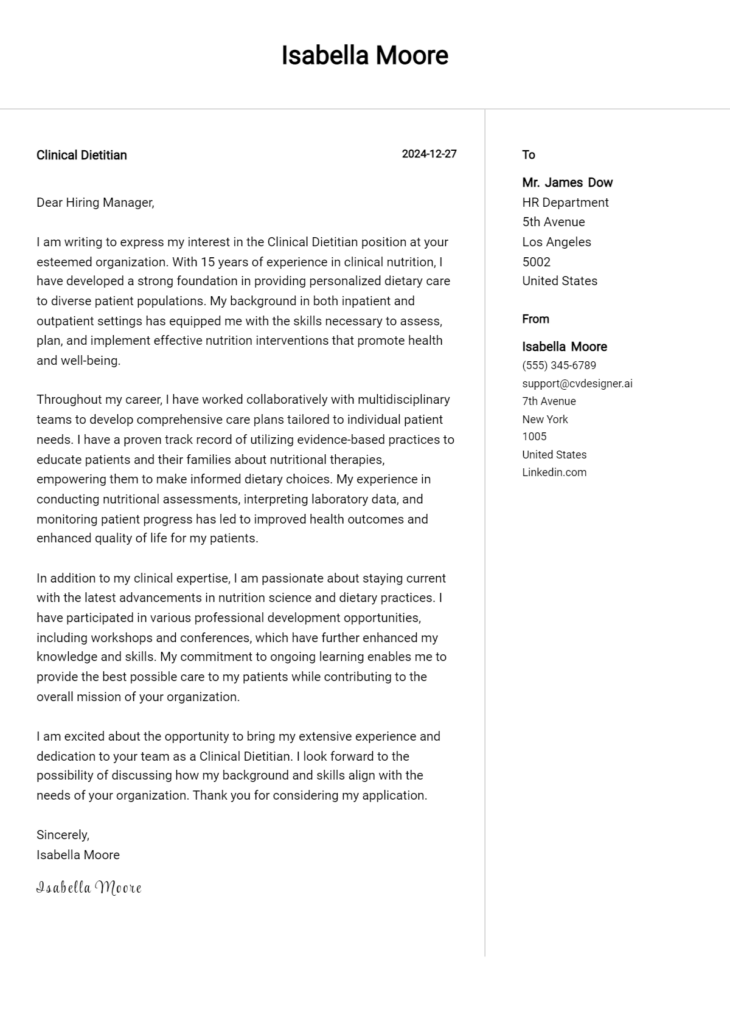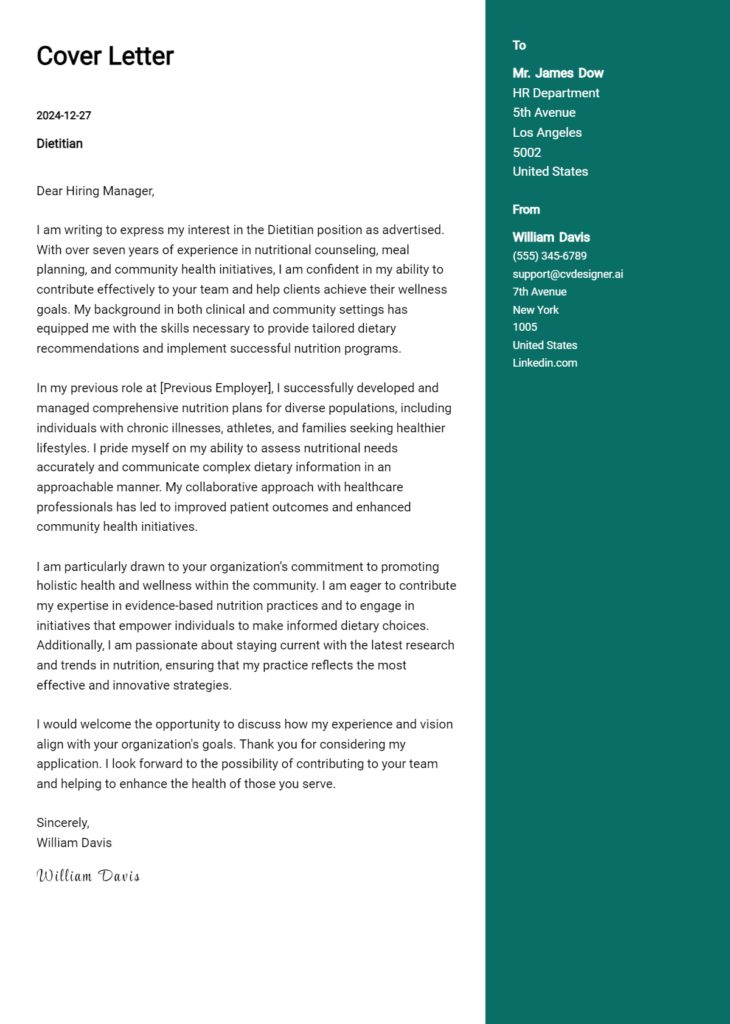Nutrition Consultant Cover Letter Examples
Explore additional Nutrition Consultant cover letter samples and guides and see what works for your level of experience or role.
How to Format a Nutrition Consultant Cover Letter?
Crafting a compelling cover letter is crucial for a Nutrition Consultant, as it serves as your first opportunity to make a positive impression on potential employers. Proper formatting not only showcases your professionalism but also reflects your ability to communicate effectively—an essential skill in the nutrition field. A well-structured cover letter can highlight your relevant qualifications and experiences while demonstrating your passion for promoting health and wellness.
In this guide, we’ll delve into the key components necessary for an impactful Nutrition Consultant cover letter, including:
- Cover Letter Header
- Cover Letter Greeting
- Cover Letter Introduction
- Cover Letter Body
- Cover Letter Closing
Each section is integral to conveying your expertise and enthusiasm for the role. Let’s explore how to format each part to ensure your cover letter stands out in the competitive nutrition industry.
Importance of the Cover Letter Header for a Nutrition Consultant
A well-structured cover letter header is vital for a Nutrition Consultant as it sets the tone for the entire application and establishes a professional first impression. The header should include your contact information, the date, and the recipient's details, ensuring that the letter is easy to navigate and reference. Clarity and professionalism are paramount in these details, as they reflect your attention to detail and organizational skills—qualities that are essential in the nutrition field. A strong header conveys that you take the application process seriously and are committed to providing clear and concise communication.
Strong Example
Jane Doe 123 Healthy Way Wellness City, ST 12345 jane.doe@email.com (555) 123-4567 October 10, 2023 Mr. John Smith Hiring Manager Nutrition Solutions Inc. 456 Nutrition Lane Healthy Town, ST 54321
Weak Example
jane doe 10/10/23 Nutrition Solutions
The Importance of the Cover Letter Greeting
The greeting of your cover letter is the first impression you make on a potential employer, setting the tone for the rest of your application. A well-crafted greeting not only demonstrates your professionalism but also reflects your attention to detail and genuine interest in the position. By addressing the hiring manager directly, you personalize your letter and foster a connection that can make you stand out among other candidates. To achieve this, it's crucial to avoid generic greetings like "To Whom It May Concern." Instead, take the time to research the recipient's name and title; this small effort can significantly enhance the impact of your cover letter.
Here are examples of strong and weak greetings for a Nutrition Consultant cover letter:
Strong Example
Dear Ms. Johnson,
Weak Example
To Whom It May Concern,
The Importance of a Compelling Cover Letter Introduction for a Nutrition Consultant
A well-crafted cover letter introduction is crucial for a Nutrition Consultant as it serves as the first impression to the hiring manager. This opening paragraph should not only capture their attention but also convey the candidate's genuine interest in the role. Moreover, it is an opportunity to briefly highlight key skills or achievements that align with the job requirements. A strong introduction sets the tone for the rest of the letter and can significantly influence the hiring manager's decision to read on. Below are examples of both strong and weak cover letter introductions for a Nutrition Consultant role.
Strong Example
Dear [Hiring Manager's Name], I am thrilled to apply for the Nutrition Consultant position at [Company Name] as advertised on [Job Board]. With over five years of experience in developing personalized nutrition plans and a Master’s degree in Nutrition Science, I have successfully helped clients achieve their health goals through evidence-based strategies. My passion for promoting healthy lifestyles and my proven track record of improving client outcomes make me an ideal candidate for your team.
Weak Example
Hello, I am interested in the Nutrition Consultant job at your company. I have some experience in nutrition and I think I might be a good fit. I hope you consider my application.
Purpose of the Cover Letter Body for a Nutrition Consultant
The body of a cover letter for a Nutrition Consultant serves as a pivotal section where candidates can effectively highlight their skills, experiences, and the unique value they bring to the organization. This is the opportunity to connect their professional background with the specific needs of the company, showcasing relevant projects or accomplishments that demonstrate their expertise in nutrition and client engagement. A well-crafted cover letter body not only outlines qualifications but also conveys enthusiasm for the role, making a compelling case for why the candidate is an ideal fit for the position.
Strong Example
As a certified Nutrition Consultant with over five years of experience in developing personalized nutrition plans, I successfully led a project at ABC Wellness Center that increased client retention by 30% through tailored dietary programs. My expertise in conducting nutritional assessments and creating engaging workshops has empowered clients to achieve their health goals. Additionally, I collaborated on a community outreach initiative that provided nutrition education to over 200 families, significantly impacting their dietary habits. I am eager to bring my passion for nutrition and proven ability to drive results to your team at XYZ Health Services.
Weak Example
I have a degree in Nutrition and I think I would be a good fit for your company. I like helping people and have done some work related to nutrition before. I hope to bring my skills to your organization.
Importance of the Cover Letter Closing for a Nutrition Consultant
The closing paragraph of a cover letter is crucial as it serves to summarize your qualifications, express enthusiasm for the position, and encourage the hiring manager to take the next steps, such as reviewing your resume or scheduling an interview. A strong closing reinforces your suitability for the role and leaves a positive impression, whereas a weak closing may fail to convey your enthusiasm or commitment.
Strong Example
Thank you for considering my application for the Nutrition Consultant position. With my extensive background in nutritional science and my passion for promoting health and well-being, I am excited about the opportunity to contribute to your team. I believe my skills in personalized meal planning and client education will be a valuable asset. I look forward to the possibility of discussing my application further and am eager to share how I can help your clients achieve their health goals. Please feel free to contact me to schedule a convenient time for an interview.
Weak Example
Thanks for reading my letter. I hope you consider me for the Nutrition Consultant job. I’m not sure what else to say, but I think I could be good at it. Please let me know if you want to talk or something.
Crafting an effective cover letter is essential for candidates applying for a Nutrition Consultant position. This document serves as your opportunity to showcase your technical skills, problem-solving abilities, understanding of the SDLC (Software Development Life Cycle), teamwork experience, and a passion for continuous learning in the field of nutrition. By highlighting these aspects, you can make a strong impression on potential employers and increase your chances of landing an interview. Here are some tips to help you create a compelling cover letter:
Cover Letter Writing Tips for Nutrition Consultant
Highlight Your Technical Skills: Clearly outline your expertise in nutrition science, dietary planning, and food safety regulations. Use specific examples to demonstrate how you have applied these skills in previous roles. This can include any software tools or applications you’ve used to analyze dietary needs or track nutritional data, showcasing your familiarity with technology in your field.
Demonstrate Problem-Solving Abilities: Employers value candidates who can navigate challenges effectively. Share a brief story about a time you identified a nutritional issue and implemented a successful solution. This not only showcases your problem-solving skills but also your ability to think critically and proactively in a professional setting.
Showcase SDLC Knowledge: If applicable, discuss your understanding of the Software Development Life Cycle, particularly if you've used software for nutritional tracking or client management. Explain how your insights into this process can enhance the efficiency of nutrition programs or client interactions, positioning you as a tech-savvy consultant.
Emphasize Teamwork: Nutrition consulting often involves collaborating with other healthcare professionals, clients, and stakeholders. Provide examples of successful team projects or initiatives you have been part of. Highlight your role in fostering communication and collaboration, which is vital for achieving shared nutritional goals.
Express Your Passion for Continuous Learning: The field of nutrition is always evolving, and demonstrating a commitment to ongoing education can set you apart. Mention any relevant certifications, workshops, or courses you have completed recently. This not only shows your dedication but also reassures potential employers that you are up-to-date with the latest trends and research in nutrition.
By incorporating these tips into your cover letter, you can effectively communicate your qualifications and enthusiasm for the Nutrition Consultant role. For additional guidance, consider utilizing cover letter templates or a cover letter builder to help you structure your content professionally.
Common Mistakes to Avoid in a Nutrition Consultant Cover Letter
Crafting a compelling cover letter is essential for standing out in the competitive field of nutrition consulting. Avoiding common mistakes can significantly enhance your chances of making a positive impression. Here are some frequent pitfalls to steer clear of:
Generic Content: Many candidates use a one-size-fits-all approach. Personalize your letter to the specific job and organization. Research the company’s values and align your skills accordingly.
Lack of Specificity: Vague statements about your qualifications can weaken your application. Use specific examples of your experience, such as particular dietary plans you've developed or successful client outcomes.
Ignoring Format Guidelines: A poorly formatted cover letter can be off-putting. Adhere to a professional cover letter format that includes an introduction, body, and conclusion for clarity.
Typos and Grammatical Errors: Spelling mistakes can undermine your professionalism. Always proofread your letter or have someone else review it before submission.
Focusing Too Much on Yourself: While it’s important to highlight your qualifications, remember to emphasize how your skills can benefit the employer. Show them what you can bring to their team.
Failing to Address the Hiring Manager: A generic salutation can make your application seem impersonal. Whenever possible, address your cover letter to the specific hiring manager.
Neglecting a Call to Action: Conclude your letter with a clear call to action, expressing your eagerness for an interview and how you can contribute to the team.
For further inspiration, you can explore cover letter examples tailored for various positions, including nutrition consultants. Taking the time to avoid these common mistakes will help your cover letter shine and increase your chances of landing an interview.
Cover Letter FAQs for Nutrition Consultant
What should I include in my cover letter as a Nutrition Consultant?
As a Nutrition Consultant, your cover letter should highlight your relevant education, certifications, and experience in the field of nutrition. Start with a strong introduction that states your interest in the position and how you learned about it. Discuss your qualifications, focusing on specific skills such as dietary planning, client assessments, and knowledge of nutritional science. Mention any specialties, such as sports nutrition or weight management, that align with the job. Conclude with a call to action, expressing your desire for an interview to discuss how your skills can benefit the organization.
How can I tailor my cover letter for a specific Nutrition Consultant position?
To tailor your cover letter, carefully read the job description to identify key qualifications and skills the employer is seeking. Use specific terminology and phrases from the job posting when describing your experiences and achievements. Highlight any relevant projects or case studies that demonstrate your expertise in areas mentioned in the job description. If the position focuses on a particular demographic, such as children or seniors, emphasize your experience working with that group. Personalizing your cover letter in this way shows your genuine interest and understanding of the role.
How long should my cover letter be as a Nutrition Consultant?
A cover letter for a Nutrition Consultant should ideally be one page long, consisting of three to four paragraphs. This length allows you to provide enough detail about your qualifications and experiences without overwhelming the reader. Aim for about 250-400 words total. Focus on clarity and conciseness, ensuring each sentence contributes to your overall narrative. Remember to break up the text into easily digestible paragraphs, making it visually appealing and easy to read for hiring managers.
Should I include my salary expectations in my cover letter?
Generally, it's best to avoid mentioning salary expectations in your cover letter unless the job posting specifically requests this information. Cover letters should primarily focus on your qualifications and how you can add value to the organization. If salary discussions arise during the interview process, you can address them there when you have a better understanding of the position's responsibilities and the company's compensation structure. However, if you feel it is necessary to mention salary, keep it brief and frame it as a range based on your research and industry standards.
Build your Cover Letter in minutes
Use an AI-powered cover letter builder and have your letter done in 5 minutes. Just select your template and our software will guide you through the process.

